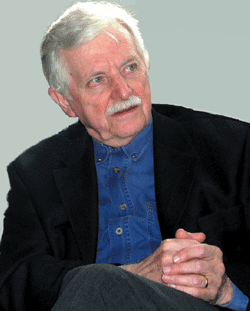 I have been asked to introduce myself to you by saying something about my
background and interests. I was born and grew up in Lancaster, a very old city in the northwest of England, just south of the Lake District, which fortunately for me has a very good grammar school and some strong poetic connections. I left the north to go to University College, London, where I did my medical studies. Unfortunately, the schism between science and the arts in English education in those days meant that I had to leave my favorite subject of English literature behind at school. These two strands in my thinking, of biology and literature, were only fully reunited when I took up psychoanalysis. Before that, however, I had worked in medicine, studied neurology, and practiced both adult and child psychiatry.
I have been asked to introduce myself to you by saying something about my
background and interests. I was born and grew up in Lancaster, a very old city in the northwest of England, just south of the Lake District, which fortunately for me has a very good grammar school and some strong poetic connections. I left the north to go to University College, London, where I did my medical studies. Unfortunately, the schism between science and the arts in English education in those days meant that I had to leave my favorite subject of English literature behind at school. These two strands in my thinking, of biology and literature, were only fully reunited when I took up psychoanalysis. Before that, however, I had worked in medicine, studied neurology, and practiced both adult and child psychiatry.
My psychoanalytic education really began at the Tavistock Clinic, which placed it strongly in a social context; my training was at the Institute of Psychoanalysis in London, mainly under the influence of Hanna Segal, Betty Joseph, and Herbert Rosenfeld. The shadow of Wilfred Bion lay across both the Tavistock and the British Society as a profound influence and infiltrated my analytic thinking.
For the last thirty years I have been seeing psychoanalytic patients daily, and since 1984, when I left the Tavi’, exclusively in private practice. You will not be surprised therefore that I emphasize that breadth of experience is the best foundation of analytic theorizing. One snag about psychoanalysis is the considerable length of time it takes to acquire it. This means that there is a longish period of dependency on teachers and the received wisdom of others. Perhaps this has tended to make analysis somewhat theory bound; it is my impression that we accept new ideas with suspicion and give up older redundant ones with even greater difficulty.
This, however, is not peculiar to psychoanalysis. For as Max Planck, a great originator in quantum physics said, “a new scientific truth does not triumph by convincing its opponents and making them see the light, but rather because its opponents eventually die, and a new generation grows up that is familiar with it.” However I do think that those of us still alive should grapple with the new, and in order to do that, release our grasp on some of the old.
Ron Britton, London, 25 March 2005
www.psychspace.com心理学空间网
